DUBAI: On the face of it, the political crisis unfolding in Tunisia could be viewed as fallout from the coronavirus pandemic, an unforeseeable event that does not look to have run its course.
The president has dismissed the prime minister, suspended parliament, declared a curfew and is ruling by decree after protests erupted on Sunday over economic hardship and soaring COVID-19 fatalities.
But such an explanation barely scratches the surface of the problems confronting the country, problems that many Tunisians now regard as almost intractable.
How did the situation reach this point in a nation that was hailed as the Arab Spring’s only success?
Judging by the images coming out of Tunisia, it seems clear that the people who blame the political class for the deteriorating economic, social and health conditions represent not some small pocket of opposition but a broad swath of public opinion. Equally, it is important to recognize that they have singled out a particular political party for criticism despite its leaders’ uncanny knack of dodging democratic accountability.
The offices of Islamist party Ennahda have become the common target of protesters’ ire in the towns of Sfax, Monastir, El-Kef, Sousse and Touzeur in recent days, as surging COVID-19 cases have overwhelmed the health system and aggravated economic problems.
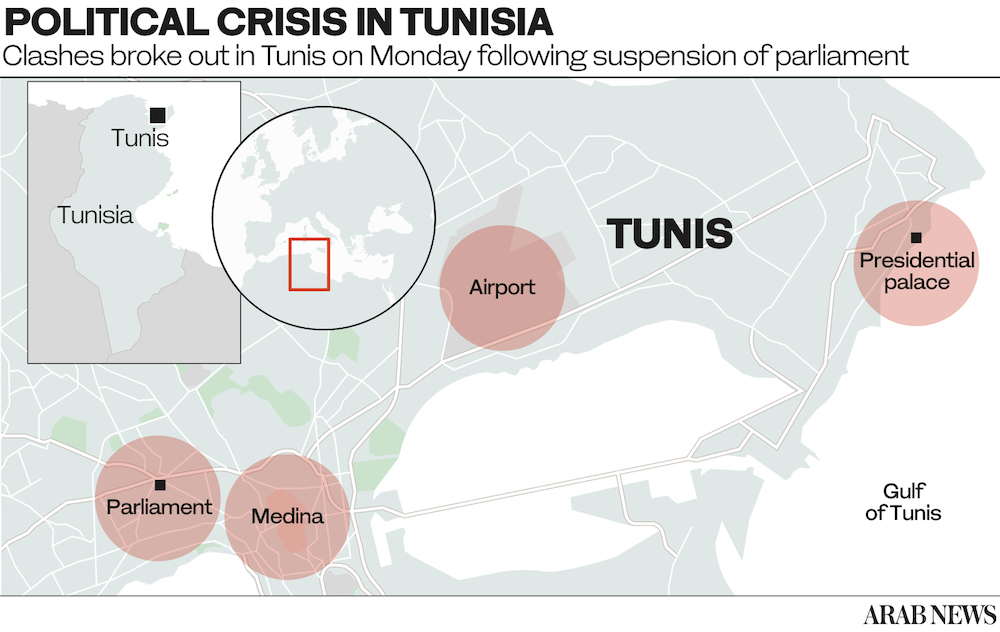
Given Tunisia’s fractured polity and fractious politics, no rival of Ennahda could have manipulated public opinion on such a massive scale. The stark truth is that the biggest party in the Tunisian parliament is facing a trust crisis of its own making.
“Until a few years ago, Tunisia used to enjoy good public-health infrastructure,” Ammar Aziz, an associate editor at news channel Al Arabiya and a Tunisian citizen, told Arab News. “But everything has collapsed, especially during the last two years, owing to mismanagement and corruption, compounded by lack of equipment. This has prompted thousands of doctors to emigrate to Europe.”
Aziz said that Tunisian authorities initially had succeeded in controlling the COVID-19 pandemic, registering zero infections in May 2020.
“However, Ennahda, which made a grand entry into power in 2019, had the government of Elyes Fakhfakh, who had been appointed prime minister by President Kais Saied in February 2020, dismissed in September,” he added.
“The new government that took over did not arrange for adequate vaccine purchases and, to make matters worse, opened the country’s borders without the needed restrictions. This caused the spread of COVID-19.”
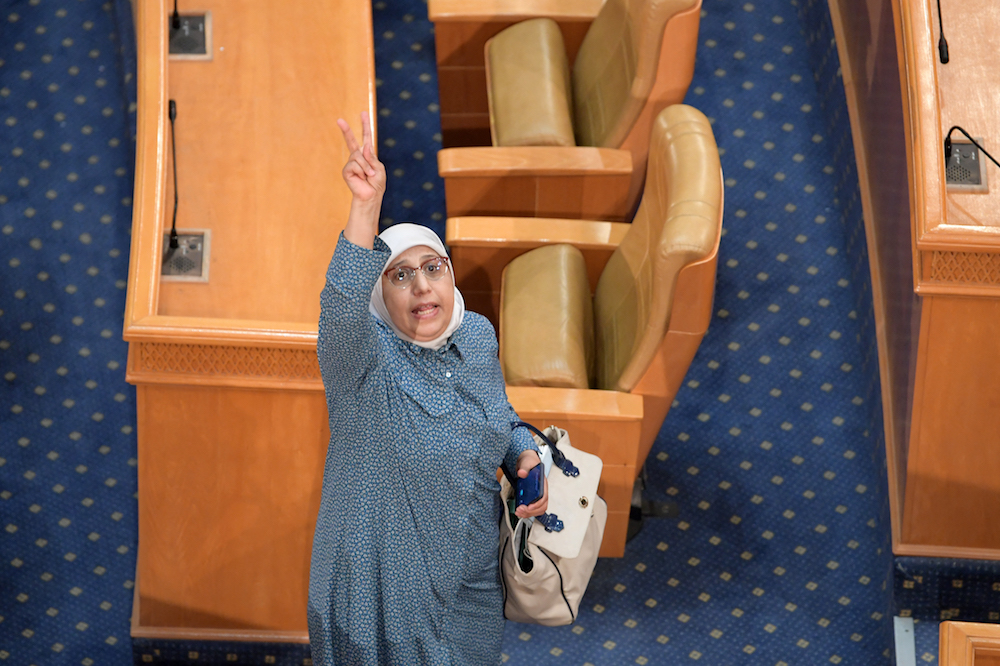
A member of the Tunisian Islamist Ennahda party flashes the victory sign following a plenary session at the parliament in the capital Tunis on July 30, 2020. (AFP/File Photo)
By mid-July, Tunisia had the highest per-capita COVID-19 death rate in Africa, and was also recording one of the continent’s highest infection rates. The health ministry acknowledged that the situation was dire. “The current situation is catastrophic,” ministry spokeswoman Nissaf Ben Alya told a local radio station. “The number of cases has risen dramatically. Unfortunately, the health system has collapsed.”
Many Tunisians consider political instability as the biggest impediment to progress in the fight against the deadly coronavirus. Tunisia has had three health ministers since the start of the pandemic. In September, it got its third government in under a year — and the ninth since the 2011 Arab Spring uprisings ended the 24-year rule of Zine El-Abidine Ben Ali.
Tunisians were not without friends in their hour of need. Saudi Arabia sent an aid package consisting of 1 million doses of COVID-19 vaccines, 190 artificial respirators, 319 oxygen tanks, 150 medical beds and 50 vital signs monitoring devices with trolleys. The UAE donated 500,000 vaccine doses. France provided the same number of vaccines, along with medical equipment and supplies.
“Ennahda was seen as wanting to take advantage of President Saied’s success in obtaining aid from Saudi Arabia and France,” Aziz said. “The party tried and succeeded in getting the minister of health (Faouzi Mehdi) replaced, making him the scapegoat for the government’s mishandling of the situation. When these revelations came out, many Tunisians concluded that Ennahda was using the pandemic to reap political profit.”
The parlous state of affairs since April might also have stirred in many Tunisians bitter memories of a time when an Ennahda-led coalition government was slow to tackle one of the deadliest extremist mobilizations in the Arab world, following the 2011 uprisings.
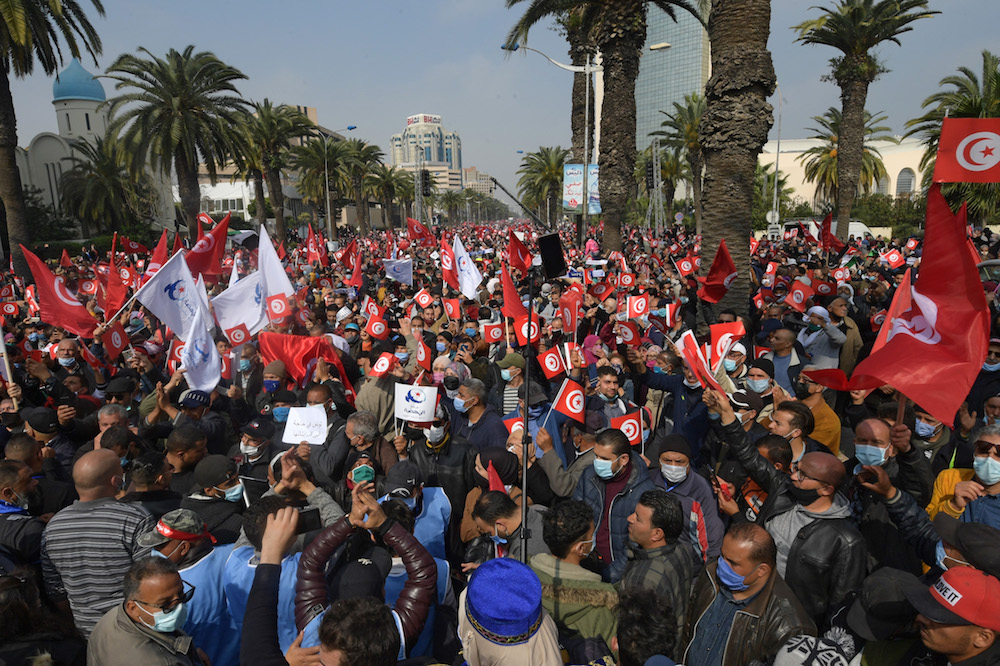
Supporters of the Islamist Ennahdha party wave flags during a demonstration in support of the Tunisian government on February 27, 2021 in the capital Tunis. (AFP)
Ansar Al-Sharia in Tunisia made the most of the post-2011 prisoner amnesties to grow its ranks. Ennahda, originally inspired by the Muslim Brotherhood in Egypt and an advocate of an overtly Islamic identity and society for Tunisia, appeared not to be up to the task of fighting militancy. The assassinations in 2013 of Chokri Belaid and Mohamed Brahmi, two leaders of the leftist Popular Front electoral alliance, further polarized Tunisian public opinion.
By the time the government designated Ansar Al-Sharia as a terrorist organization in August 2013, many saw it as a case of shutting the stable door after the horse had bolted. Five years later, a group of lawyers and politicians accused Ennahda of being behind the killings of Belaid and Brahmi, and of forming a secret organization to infiltrate the security forces and judiciary, charges the party rejected.
The government’s reluctance to take off the kid gloves and smash militancy during this formative period of Tunisian democracy has haunted Ennahda ever since. As Aaron Zelin, a fellow at the Washington Institute for Near East Policy, noted in a Wilson Center research paper: “Between 2013 and 2019, thousands joined jihadi movements abroad. … From Libya, Tunisians planned three large-scale attacks in 2015 and 2016 — at the Bardo Museum, a beach resort in Sousse, and the attempted takeover of Ben Gardane, a city along the Tunisian-Libyan border.”
As recently as 2018 the Washington Post reported that a study published by Mobdiun, an organization that works with youths in Kram West, a poor suburb of Tunis, found that nearly 40 percent of young men there said they knew someone who had joined a terrorist organization. A further 16 percent said they had been approached about adopting violent extremist ideology.
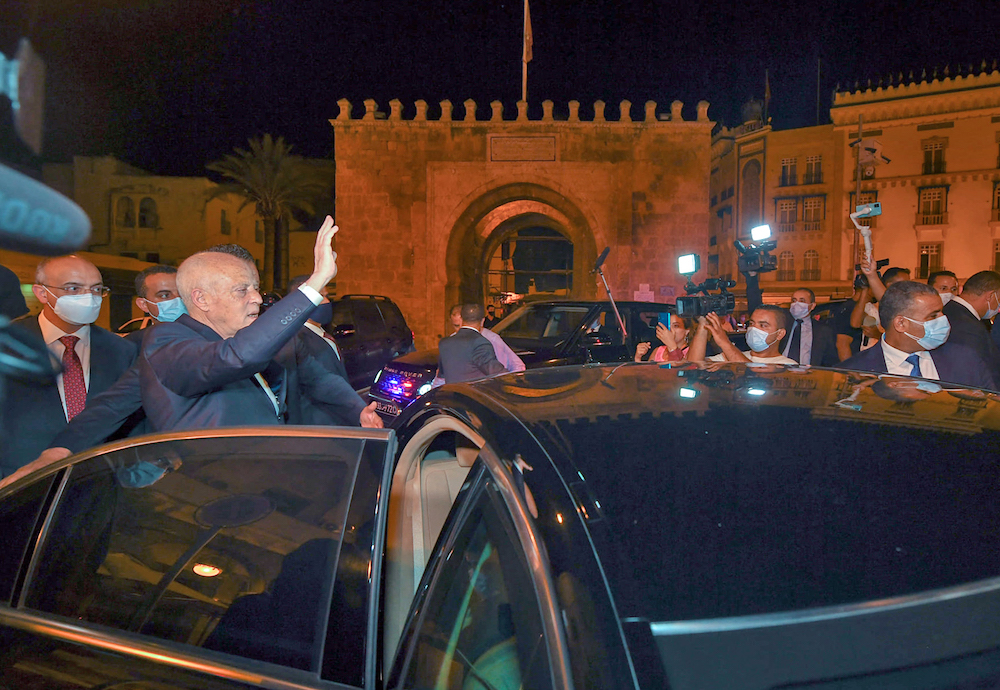
Tunisian President Kais Saied gesturing as he enters a vehicle in Tunis's central Habib Bourguiba Avenue, after he ousted the prime minister and ordered parliament closed for 30 days. (AFP/Tunisian Presidency)
Those not drawn to militancy look for other, perilous ways to fulfill their dreams and ambitions. Consequently, every month large numbers of young Tunisians risk their lives in search of a better life in Europe. According to the UN Refugee Agency, in 2020 alone 13,000 Tunisians made the sea crossing, many of them probably aware of the dangers they would face on the journey.
“If you compare the short periods in which Beji Caid Essebsi, for example, or the prime minister of Ben Ali ruled Tunisia after the departure of Ben Ali himself in 2011, and the periods in which Ennahda ruled, you will notice a big difference: terrorism appeared with Ennahda,” Aziz said.
“More recently, with Ennahda controlling parliament and also the government, everything has simply collapsed — from security to the economy. The same is true for the country’s transport system and public-health institutions. All Tunisians have noticed the deterioration and it is for this reason we saw the protests in different towns on July 25.”
In an attempt to disarm critics in the West and win over secularists at home, Ennahda announced with much fanfare in 2016 that it was moving away from its religious roots to focus more on politics. But this claimed exit from political Islam and entry into “Muslim democracy” has remained just that, a claim, critics say. As some scholars of political Islam have noted, Ennahda has yet to clarify exactly what the “Muslim democracy” to which it has committed itself actually means in practice.
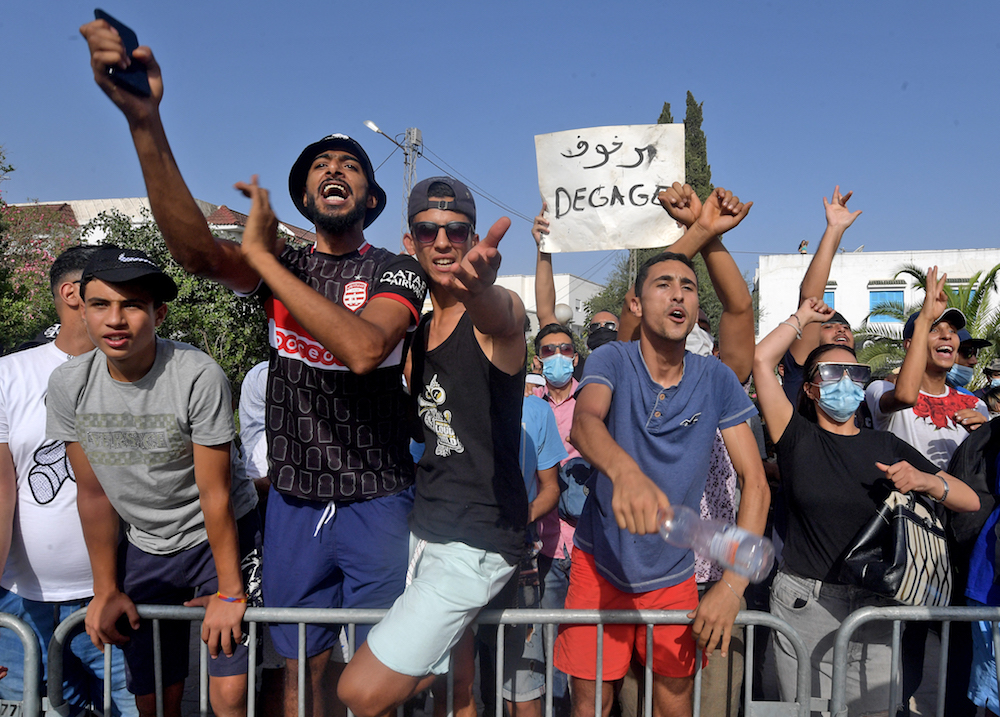
Supporters of Tunisia's President Kais Saied chant slogans denouncing the country's main Islamist Ennahda (Ennahdha) party in front of the Parliament which was cordoned-off by the military in the capital Tunis on July 26, 2021. (AFP)
Now, even as it faces growing public anger over a perfect storm of crises battering Tunisia, Ennahda knows it cannot afford to alienate its core constituency. Open admission of failure could result in loss of support from traditional Islamists.
It is also concerned that working with secular parties and making political compromises could open up ideological fissures and expose vulnerabilities. Over the years, Ennahda must have surely realized that the rhetoric of human rights and democratic politics cannot be a substitute for genuine reforms. But the jury is still out on its ability or willingness to undertake such an exercise.
“Ennahda has governed or taken part in governing Tunisia for an entire decade now. It has been the worst decade in Tunisia’s modern history, according to many people,” Aziz said, adding that the latest protests offer some indication of a widespread public sentiment.
“These Tunisians hold Ennahda responsible for all the country’s problems. They see the party as the main reason behind the ineffective governments, the widespread corruption, the lack of jobs, the unprecedented migration movements toward Italy and France and, at present, the country’s high COVID-19 death rates relative to other African and Arab countries.”






















